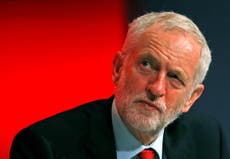Without divine intervention, it looks like Theresa May’s deal is finished
Already in the House of Commons, a cross-party consensus is growing that this is the only way through the deadlock
Rarely has a government approached the House of Commons for a positive “meaningful vote” on a vital piece of its programme with so little expectation of success. The daughter of a vicar, Theresa May must be hoping for some sort of divine intervention to assist her supposedly landmark agreement between the UK and the EU gaining parliamentary assent. The only question is the scale of the humiliation that will be heaped upon her. All things considered, it would be best if this deal was buried beyond hope of resurrection.
The thunderbolts from heaven aimed at Bernard Jenkin, Dominic Raab, Mark Francois and other media-friendly apostates have not yet struck. They have their own tablets of truth. The opposition to her deal stretches widely across the Commons and she hasn’t had much luck in changing many minds.
Ms May has, though, had a much anticipated epistle from Brussels. Written in the name of not one but two EU presidents – Donald Tusk as president of the European Council, and Jean-Claude Juncker as president of the European Commission – it promises little beyond what has already been agreed. It even references past decisions to bulk out the otherwise skimpy text. It seems to have convinced no one, least of all the DUP.
Ms May insists it has legal force, but this is acknowledged in the EU letter only to the extent that it constitutes “context” to the UK-EU withdrawal agreement and the accompanying political declaration. It implies that one day the future of the UK’s relations with Europe may have to be argued over in some dusty international arbitration court room, or, worse, the European Court. It does not deliver the reality of national sovereignty yearned for by the Brexiteers.
Ms May has managed to persuade a few to her side, such as Sir Edward Leigh and Geoffrey Clifton-Brown. They buy the argument pushed by No 10 that voting down the May deal risks no Brexit at all. Yet this is to underestimate the extent to which the Brexiteers’ believe that they can still secure what they want and, in their view, what the British people voted for in 2016. For them the May deal doesn’t actually represent Brexit at all.
Some, such as Boris Johnson, sincerely believe that the May deal is in fact inferior to staying in the EU on the existing terms. They are at least right in that respect, for it commits the UK to accepting EU rules over the customs union and, in part, the single market for as long as it takes to find a “technological” answer to the Irish border issue – the so-called backstop. As no technological solution has yet been discovered, and will not be found, the UK will stay in the customs union indefinitely. Britain will be a rule taker, not a rule maker, as the saying goes. This is not what many Brexiteers want.
And whatever happened to “nothing is agreed until everything is agreed”? For the original idea, now forgotten by ministers, conveniently enough, was that the £39bn payment to the EU and the rest of the withdrawal treaty would only be agreed on condition that a satisfactory future trade and security treaty was also completed. This has not happened. This is a “blind Brexit”, with all the best negotiating cards being passed to Brussels. It is far, far worse than staying in the EU.
“Soon”, to use his word, Jeremy Corbyn will table a motion of no confidence in Her Majesty’s Government, which will almost certainly be lost. That should remove the sole remaining obstacle to his party doing what its MPs and members alike want, overwhelmingly, and according to party policy – a Final Say referendum.
Already in the House of Commons, a cross-party consensus is growing that this is the only way through the deadlock. The Commons will soon discover that there is no majority for anything – except that no-deal Brexit is unacceptable, and neither is the May deal. That is one of the few bright points of light and hope in the otherwise bleak scene in Westminster.



Join our commenting forum
Join thought-provoking conversations, follow other Independent readers and see their replies